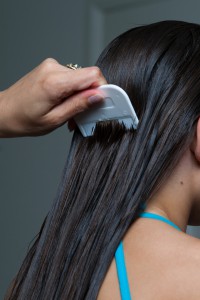For parents of preschool and elementary school aged children, going back to school can sometimes result in your child bringing home some new friends: head lice.
Head lice, which can’t jump or fly, are transmitted by direct physical contact with the hair of an infested person, feeding on blood and attaching their eggs to the base of hair shafts. Head lice do not spread disease, and getting head lice is not related to the cleanliness of your child or your home.
Contact can occur among children during play at school or sporting activities or by sharing hats, scarves, combs or brushes. Some studies suggest that girls get head lice more often than boys, probably due to more frequent head-to-head contact. Infestation with head lice is much less common among African-Americans than among persons of other races.
Permethrin is an over-the-counter treatment used to treat lice. Recently, 25 states, including New York and New Jersey, have reported head lice that don’t respond to permethrin, but don’t be discouraged. The good news is that prescription medications that don’t contain permethrin are still effective including benzyl alcohol, ivermectin, malathion, spinosad, and lindane shampoo. Prescriptions might be pricier, but will save you money in the long run.
Treatment for head lice is recommended for all household members and all should be treated at the same time. Hats, scarves, pillow cases, bedding, clothing, and towels worn or used by the infested person in the 2-day period just before treatment should be machine washed and dried using the hot water and hot air cycles. Lice and their eggs are killed within five minutes of exposure to temperatures greater than 53.5°C (128.3°F). Items that cannot be laundered may be dry-cleaned or sealed in a plastic bag for two weeks. Vacuuming furniture and floors can remove an infested person’s hairs that might have viable nits (louse eggs) attached.
All content of this newsletter is intended for general information purposes only and is not intended or implied to be a substitute for professional medical advice, diagnosis or treatment. Please consult a medical professional before adopting any of the suggestions on this page. You must never disregard professional medical advice or delay seeking medical treatment based upon any content of this newsletter. PROMPTLY CONSULT YOUR PHYSICIAN OR CALL 911 IF YOU BELIEVE YOU HAVE A MEDICAL EMERGENCY.

